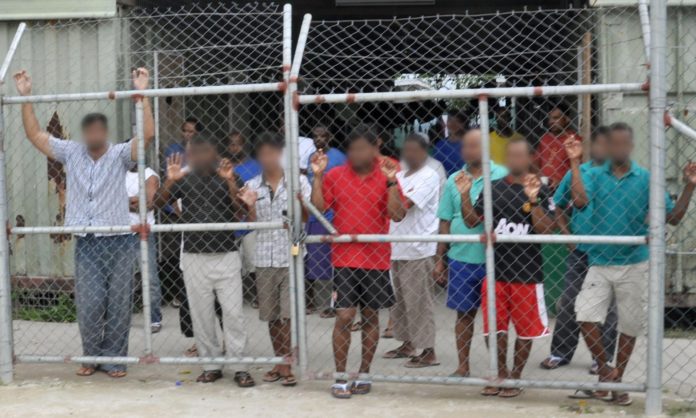
Having worked as a counsellor in immigration detention for several years, for contractor International Health and Medical Services (IHMS), any discussions surrounding my former place of employment could very well be illegal after Wednesday. This is because of the secrecy provision in the Border Force Act, a disturbing piece of legislation which is about to become law and is likely to have far-reaching consequences.
Under this legislation it is a criminal offence, punishable by up to two years’ imprisonment, for anyone who works in, or has previously worked in immigration detention to “make a record of or disclose” information regarding their employment. There are a number of things that need to be said before this somewhat modest piece of dissent could put me in front of a judge.
So now, fortunately, I can still discuss the damage that I have seen first-hand in immigration detention. The damage that has been done to men, women and children. The families I have seen arbitrarily separated. Asylum seekers whose healthcare needs have been subverted and neglected, as they did not align with the immigration department’s goals.
There was never a clear position description for a counsellor, so you often found yourself conducting any number of clinical tasks – whether it be more orthodox work or dealing with things that had become commonplace in immigration detention, such as serious self-harm and protests. You can engage in these things naively, at least for a short time, until it becomes clearer that you are balancing between complicity and advocacy in a system where it is often more productive to engage with red tape and bureaucracy.
Now I am rarely surprised when there is a cover-up or abuse. I have witnessed the secrecy, authoritarianism and hypocrisy first-hand. I have seen people push over fences with opportunities to escape, only to return, as they would not be able to survive in the outback.
I have seen the damage Nauru and Manus have done; sending psychotic people, broken and defeated to Villawood after all options were exhausted offshore. I could tell you about the self-harm I have seen and I should put this on record one more time, as it may be the last, that immigration detention has a devastating and long-lasting impact on mental health.
But the overwhelming majority of the people I have met in immigration detention are patient and resilient – who would have thought?
Many have spoken out before me and offered many more insights into immigration detention. If it weren’t for them, we would not know the extent of the conditions in both onshore and offshore centres. The compromised nature of medical care as noted by the Christmas Island doctors, the devastating impact immigration detention has on mental health as raised by Peter Young or the abuse of children as raised by Save the Children staff.
The fact that speaking out may now be illegal shows just how much there is to hide
With headlines that appear to be getting more and more shocking as the weeks go by, this is one area which demands transparency and oversight. This would not aid people smugglers, nor would it encourage people to “jump on a boat”. It would provide basic protections for an already vulnerable group. When women and children are allegedly being sexually abused and there are epidemic levels of self-harm, it is not a rational response to make a secretive system more secretive and to attempt to silence those who raise legitimate concerns.
This is unfortunately what immigration detention has become, an anomaly in today’s society. While other institutions and policies have evolved, this remains a system in which we are happy to flirt with the idea of sending health professionals to jail for speaking of their experiences. In a country that is now talking about mental health, we are happy to disregard epidemic levels of self-harm and suicide as “manipulative” or “attention seeking”. And in a country where there is universal support for the royal commission into institutional responses to child sexual abuse, we are happy to remain wilfully ignorant of it in immigration detention.
Whatever side of the asylum seeker debate you stand on, the Border Force Act should alarm you. This legislation has implications beyond clinicians working in immigration detention. It raises questions about the entire medical profession, complicity, and their stance on ethical and human rights issues. In recent weeks a number of medical groups have rightly raised concerns about this legislation, calling for health professionals to be allowed to speak out about the conditions in detention adding to their long opposition to mandatory detention. In response to this, a spokeswoman for the immigration minister has reminded us that there are appropriate mechanisms and protections for those reporting misconduct and “maladministration”.
This “maladministration” has been discussed, protested about and critiqued by health professionals, academics, lawyers and human rights experts for more than 20 years. Democracy can only function properly with accountability and transparency. I only hope many more individuals come forward after 1 July and simply speak about what they have seen. The fact this may now be illegal and seen as “sensational” shows just how much there is to hide.
Ryan Essex is a PhD student at the University of Sydney, examining healthcare, ethics and immigration detention
Source: The Guardian
